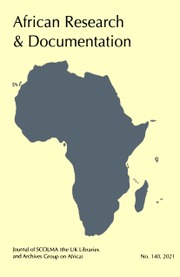No CrossRef data available.
Article contents
‘Publish or Perish’ in African Studies: New Ways to Valorise Research
Published online by Cambridge University Press: 25 April 2022
Abstract
New modes of publishing African Studies accelerate research, creating digital repositories, but valuing the outcomes is complex, and contested. For tenure of both librarians and academics, refereed publications remain the Holy Grail. Fears of quality decline accompany a rise in self-publishing and inverse social media brevity. Valuing works requires reliable sources, but permanency concerns remain: online news in Africa can quickly disappear, as evident with Ebola reporting; and if you trust Google, in African languages some news never occurred! But at the same time, new modes of publishing and communication allow wider review, and the contesting of canon. Twenty years ago, Africanists hoped open access credentialing was just around the corner. This has not eventuated but a measure of recognition is conceded as society itself goes online. Blogs and open access journals will not clinch jobs, but they can let scholars leave an imprint. Graduate digital courses with blogs replacing essays and completed projects offered back to libraries show a trend to capacitise a new generation of teachers, valorising research. Librarian job descriptions insist on digital skills. Granting bodies privilege the digital. Publishers go online. African studies associations hold digital workshops. If output in core media maintains centrality in ranking and citation then there is now a merging of forms. New books appear, some to acclaim, using digital sources, new knowledge discovery techniques emerge. Across all these trends, there will remain a need to balance digital and print collected by libraries, and refereed writing with more spontaneous communication, but their boundary is likely to narrow.
- Type
- Other Articles
- Information
- Copyright
- Copyright © International African Institute 2016
Footnotes
This article is based on the author's contribution to a panel on “Publish or perish in African Studies” convened by Stephanie Kitchen and Hartmut Bergenthum at the ECAS Conference held in Paris in July 2015.
References
Notes
1 A prominent example is the blog Africa4, by a member of our Paris 2015 EC AS panel, Vincent Hiribarren (King's College London), for the Paris newspaper Liberation (http://libeafrica4.blogs.liberation.fr).
2 Some of these projects can be glimpsed at http://history.msu.edu/hst830/ and at http://imbiza.matrix.msu.edu
3 Such as, for example, the current MSU Social Work course, ‘Surviving the coming zombie apocalypse - disasters’, http://zombie.msu.edu. The abovementioned course in Digital African History also represents a sharp departure from traditional curriculum. Globally, there is considerable curricular experimentation.
4 Deborah Lupton, Digital sociology (Abingdon, Oxon: Routledge, 2015).
5 Deborah Lines Andersen, ed., Digital scholarship in the tenure, promotion, and review process. (Armonk, N.Y.: M.E. Sharpe, 2004).
6 The impressive Amistad's orphans: an Atlantic story of children, slavery, and smuggling by Benjamin Lawrence (New Haven/London: Yale University Press, 2014) draws considerably on website data.
7 Hartmut Bergenthum, ‘African newspapers in the online world: information gains and losses’, pp. 197-220 in African Studies in the Digital Age: Disconnects? edited by Terry Barringer and Marion Wallace (Leiden: Brill, 2014).
8 The first Yoruba-language newspaper (Abeokuta, 1860-1865).
9 Most notably in the revived ‘African Treasury Series,’ previously published (from 1935) as ‘Bantu Treasury’.
10 Peter Alegi, ‘Podcasting the past: Africa past and present and (South) African history in the digital age,’ South African historical journal, 64(2) 2012, 206-220; Keith Breckenridge, Biometric state: the global politics of identification and surveillance in South Africa (New York: Cambridge University Press, 2014); Lovejoy, Eltis and Hawthorne podcasts: afripod.aodl.org/tag/slavery; Lawrence, Amistad's orphans.
11 Chris Benner, ‘Digital dynamics: new technologies and work transformations in African cities', in The Routledge handbook on cities of the Global South edited by Susan Parnell and Sophie Oldfield (London: Routledge, 2014), 236-252.
12 Bibliotheque numérique de l'UCAD (Université Cheikh Anta Diop de Dakar): http://bibnum.ucad.sn




